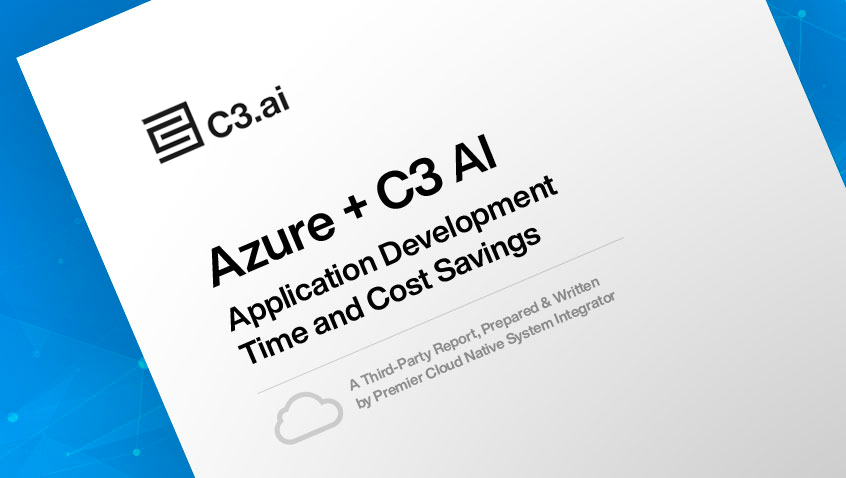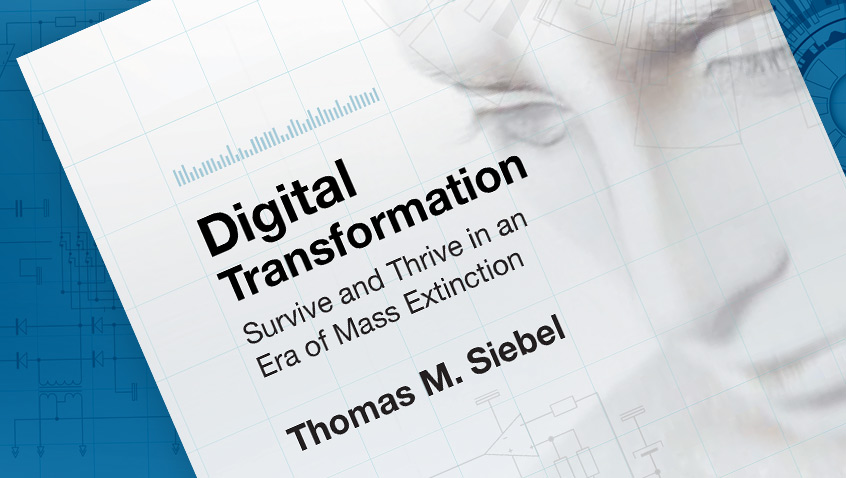- AI Software
- C3 AI Applications
- C3 AI Applications Overview
- C3 AI Anti-Money Laundering
- C3 AI Cash Management
- C3 AI CRM
- C3 AI Decision Advantage
- C3 AI Demand Forecasting
- C3 AI Energy Management
- C3 AI ESG
- C3 AI Intelligence Analysis
- C3 AI Inventory Optimization
- C3 AI Process Optimization
- C3 AI Production Schedule Optimization
- C3 AI Property Appraisal
- C3 AI Readiness
- C3 AI Reliability
- C3 AI Smart Lending
- C3 AI Sourcing Optimization
- C3 AI Supply Network Risk
- C3 AI Turnaround Optimization
- C3 AI Platform
- C3 Generative AI
- Get Started with a C3 AI Pilot
- Industries
- Customers
- Resources
- Generative AI
- Generative AI for Business
- C3 Generative AI: How Is It Unique?
- Reimagining the Enterprise with AI
- What To Consider When Using Generative AI
- Why Generative AI Is ‘Like the Internet Circa 1996’
- Can Generative AI’s Hallucination Problem be Overcome?
- Transforming Healthcare Operations with Generative AI
- Data Avalanche to Strategic Advantage: Generative AI in Supply Chains
- Supply Chains for a Dangerous World: ‘Flexible, Resilient, Powered by AI’
- LLMs Pose Major Security Risks, Serving As ‘Attack Vectors’
- C3 Generative AI: Getting the Most Out of Enterprise Data
- The Key to Generative AI Adoption: ‘Trusted, Reliable, Safe Answers’
- Generative AI in Healthcare: The Opportunity for Medical Device Manufacturers
- Generative AI in Healthcare: The End of Administrative Burdens for Workers
- Generative AI for the Department of Defense: The Power of Instant Insights
- What is Enterprise AI?
- Machine Learning
- Introduction
- What is Machine Learning?
- Tuning a Machine Learning Model
- Evaluating Model Performance
- Runtimes and Compute Requirements
- Selecting the Right AI/ML Problems
- Best Practices in Prototyping
- Best Practices in Ongoing Operations
- Building a Strong Team
- About the Author
- References
- Download eBook
- All Resources
- C3 AI Live
- Publications
- Customer Viewpoints
- Blog
- Glossary
- Developer Portal
- Generative AI
- News
- Company
- Contact Us
Glossary
- Artificial Intelligence
- AI in Finance
- Anomaly Detection
- Anti-Money Laundering
- Asset Performance Management
- Asset Reliability
- Digital Disruption
- Digital Transformation
- Digital Twin
- Elastic Cloud Computing
- Energy Management
- Enterprise AI
- Enterprise AI Platform
- Ethical AI
- Inventory Planning
- IoT Platform
- Know Your Customer (KYC)
- Machine Vision (Computer Vision)
- Model-Driven Architecture
- Multi-Cloud
- No Code
- Predictive Analytics
- Predictive Maintenance
- Stochastic Optimization
- Type System
- Data Unification & Management
- Machine Learning (A to L)
- Artificial General Intelligence
- Bias
- Canonical Schema
- Canonical Transform
- Classification
- Classifier
- Classifier Performance
- Clustering
- Coefficient of Discrimination, R-Squared (R2)
- Convolutional Neural Network (CNN)
- Correlation
- Data Cleansing
- Data Labels
- Data Lineage
- Deep Learning
- Dimensionality Reduction
- Explainable AI
- F1 Score
- False Positive Rate
- Feature Engineering
- Feedback Loop
- Field Validation
- Gaussian Mixture Model (GMM)
- Generalized Linear Models
- Gradient-Boosted Decision Trees (GBDT)
- Features
- Ground Truth
- Holdout Data
- Hyperparameters
- Information Leakage
- LIME: Local Interpretable Model-Agnostic Explanations
- Linear Regression
- Loss Function
- Low-Dimensional Representation
- Machine Learning (M to Z)
- Mean Absolute Error
- Mean Absolute Percent Error
- Machine Learning Pipeline
- Model Drift
- Model Prototyping
- Model Training
- Model Validation
- Normalization
- Overfitting
- Precision
- Problem Tractability
- Random Forest
- Recall
- Receiver Operating Characteristic (ROC) Curve
- Regression Performance
- Regularization
- Reinforcement Learning
- Reporting Bias
- Ridge Regression
- Root Mean Square Error (RMSE)
- Selection Bias
- Shapley Values
- Supervised Machine Learning
- Tree-Based Models
- Underfitting
- Unsupervised Machine Learning
- XGBoost
Linear Regression
What is Linear Regression?
Linear regression models a relationship between input variables and an output variable and can be used to predict the value of a response to a new set of inputs. A simple linear regression is a line fitted to existing pairs of one independent variable and a dependent variable, with a parameter designating the slope of the line and a bias the y-intercept. Fitting the line or curve to the data is accomplished by minimizing the error between the observed values and the formulated values using some form of loss function like least squares, ridge regression, or lasso.
Why is Linear Regression Important?
Linear regression is a fundamental algorithm used in supervised learning cases because of its simple and well-understood application to a variety of problems like predicting trends in science, healthcare, finance, economics, and consumer behavior. Linear regression supports several estimation techniques, loss functions, and convergence methods to fit different optimization and time/cost goals.
How C3 AI Enables Organizations to Use Linear Regression
C3 AI makes it easy to apply different optimization techniques like linear regression to address domain-specific applications of AI to deliver business value today. The C3 AI® Platform is a complete, end-to-end platform for designing, developing, deploying, and operating enterprise AI applications at industrial scale. Data scientists can use the C3 AI Platform’s ML/AI services to get a full view into the source data, explore and develop model features, and test and evaluate different ML models and their predictive performance.
Linear regression is one of many statistical and modeling techniques in production on the C3 AI Platform, which includes basic statistics, supervised and unsupervised learning, reinforcement learning, optimization, collaborative filtering, dimensionality reduction, and deep learning.



